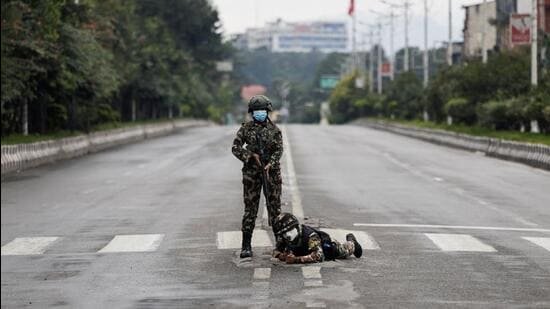The attack in a quiet embassy district of Doha, which killed several Hamas officials and a member of the Qatari security forces, punctuated an already growing realization that Israel has made a strategic decision to secure itself through force of arms even at the expense of its diplomatic ties.
It also raised questions about whether the U.S. can be counted on to impose restraint and deliver protection, especially when Gulf states themselves are in the firing line.
Arab states reacted with sharp expressions of anger. Saudi Arabia, the United Arab Emirates and Qatar all condemned the attack as a violation of international law. Anwar Gargash, a former U.A.E. minister of state for foreign affairs, called the strike treacherous, as U.A.E. leader Mohamed bin Zayed Al Nahyan rushed to Doha. Saudi Crown Prince Mohammed bin Salman was expected to travel to the Qatari capital as well.
President Trump criticized the strike Tuesday, regretting that it happened in Qatar and pledged it wouldn’t happen again. But he also praised killing Hamas members as a worthy goal.
Beyond the immediate exchange of criticism, the region’s wealthy Gulf nations are sorting through a newly scrambled geopolitical order and weighing whether to view Israel as a potential partner, a security risk or both.
That is a rupture from recent years, when two Gulf nations that sit on either side of Qatar, the U.A.E. and Bahrain, established formal ties with Israel under the Abraham Accords, while Saudi Arabia and others considered normalization moves of their own.
The aim of the accords was to integrate Israel as an equal partner in the region, said Khaled Elgindy, a visiting scholar at Georgetown University’s Center for Contemporary Arab Studies. Instead, he said, it is acting as hegemon.
“This is not what they signed up for,” Elgindy said. “There is some buyers’ remorse.”
The attack on Hamas in Doha followed months of growing stress on Israel’s relationship with the Gulf. Momentum on normalization ground to a halt with the rising civilian toll of the war in Gaza, sparked by Hamas’s deadly attacks on Israel nearly two years ago, and the dimming likelihood of a Palestinian state.
When Israel attacked Iran in June, it was taking on a common threat. But while Arab governments benefited from a weakened Iran, they worried about Israel’s appetite for using its military and intelligence superiority in the region.
Strikes on Iran’s military leadership raised concerns that Israel might aim for regime change and plunge the region into years of chaos. The attack in Doha left many wondering if any red lines remained.
“There is a concern among these countries that Israel has become too militarily powerful and unrestrained, which they fear could lead to further regional conflagrations and instability,” said Asher Fredman, the director for Israel at the Abraham Accords Peace Institute.
The attack leaves Gulf countries in a bind over how to respond. Gulf officials have held calls to discuss the need for a strong, unified answer to Israel, but had yet to figure out specifics, people familiar with the calls said. Senior Saudi officials plan to communicate to the U.S. that American aspirations for peace through regional integration are at risk, the people said.
“This is definitely a major break, which we now call Israel a major destabilizing force in the region,” said Abdulkhaleq Abdulla, an influential Emirati political scientist in Dubai.
Qatar has signaled it would suspend its role as mediator in talks between Israel and Hamas. Its coordination with Israel on security issues outside formal diplomatic ties will also be badly damaged, said Hussein Ibish, a senior resident scholar at the Arab Gulf States Institute, a Washington-based think tank.
But he thinks nations such as Qatar are more likely to slow the improvement of ties rather than stop cooperation altogether.
“Qatar is too dependent on the United States to abandon that relationship,” he said.
Gulf states are also reckoning with the future of their reliance on the U.S., which maintains a heavy presence in the region to protect allies and secure the world’s energy supply.
The monarchies of the Gulf have invested heavily in their relationship with Washington and with Trump specifically, with some Gulf leaders favoring his personal, transactional style of diplomacy and more aggressive stance on Iran. Trump visited Riyadh and other Gulf capitals in May and was embraced by Arab royals in gilded palaces, where he praised their stability and prosperity.
The war with Iran, which went farther than the Gulf was comfortable with, and the attack on Doha have led countries to question whether their investments are paying off in influence or safety.
America’s willingness to protect Gulf states has come into question in the past. In 2019, a drone and missile attack attributed to Iran pierced Saudi air defenses and struck one of the kingdom’s major oil facilities. Over the summer, Iran launched a missile attack on an American air base in Qatar.
“With the peace shattered twice in three months, I have to imagine that people throughout the Gulf are beginning to question the credibility of the U.S. as a security partner,” said Dana Shell Smith, a former U.S. ambassador to Qatar.
Wealthy from their vast reserves of oil and gas and wielding outsize global influence, the Gulf states have never engaged in direct armed conflict with Israel, unlike neighbors such as Syria and Egypt, which fought several wars with Israel following its founding in 1948.
Qatar itself is designated a major non-NATO ally by the U.S. and hosts the largest American military base in the region, with thousands of U.S. soldiers. The country has bet on its ties with Washington and earlier this year gifted a large plane to the U.S. government for future use as Air Force One.
The Gulf states have long seen their greatest security threats elsewhere. Iraq under Saddam Hussein invaded neighboring Kuwait. Across the Persian Gulf, revolutionary Iran amassed an arsenal of missiles and built a strategy for projecting regional influence. Yemen’s Iranian-allied Houthi rebels launched a series of drone and missile attacks into Saudi Arabia during the countries’ long war.
Both the Trump and Biden administrations encouraged Israel and countries like Saudi Arabia to normalize relations in a move that would broadly integrate the Middle East, unlocking new economic possibilities and breaking a decades-old Arab diplomatic boycott.
Before 2020, when the U.A.E., Bahrain and Morocco recognized Israel, Egypt and Jordan were the only Arab countries with diplomatic ties to it.
After Israel signed the Abraham Accords, the U.S. expanded its major military command for the Middle East to include Israel, a step toward regional security integration that helped Israel tackle the missile and drone threat from Iran
Hamas’s Oct. 7, 2023, attacks catalyzed a shift in strategic thinking in Israel in which the country has demonstrated a high appetite for risk and a willingness to use its military and intelligence superiority to strike perceived foes across the region.
Israel’s new approach, led by Prime Minister Benjamin Netanyahu, comes with both advantages and risks.
“On the one hand Israel is now a power that can destabilize the situation in no time,” said Eldad Shavit, a former Israeli military intelligence officer who also served for years in the prime minister’s office under Netanyahu. “On the other hand, Israel is a really strong power that has the intelligence and the military capability to do unimaginable things.”
Another consideration for Gulf states is that their citizens are overwhelmingly sympathetic to Palestinians. While their leaders aren’t elected, they are privately concerned about their long-term viability, particularly after protests ousted the leaders of Egypt and other countries in 2011.
“What Netanyahu never takes into account and Israel refuses to take into account is that there is also a domestic audience to what these governments are doing,” said Yossi Mekelberg, a senior consulting fellow at Chatham House in London. “These governments actually absorb a lot, but when they absorb this, it means that there was a domestic price.”
Write to Jared Malsin at jared.malsin@wsj.com, Summer Said at summer.said@wsj.com and Benoit Faucon at benoit.faucon@wsj.com











